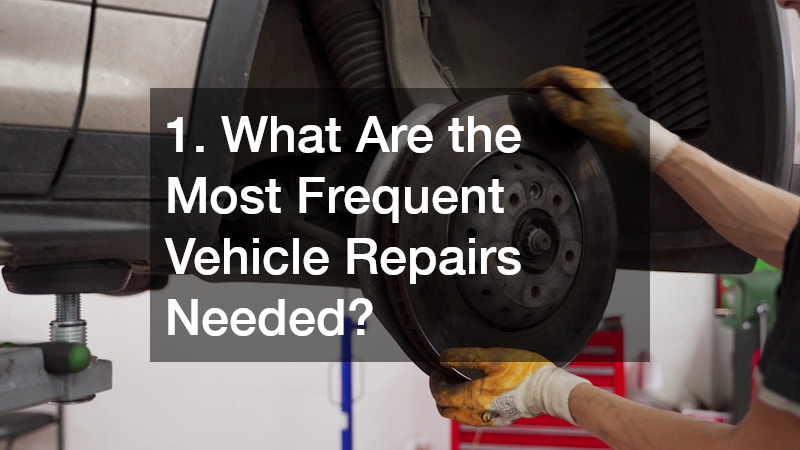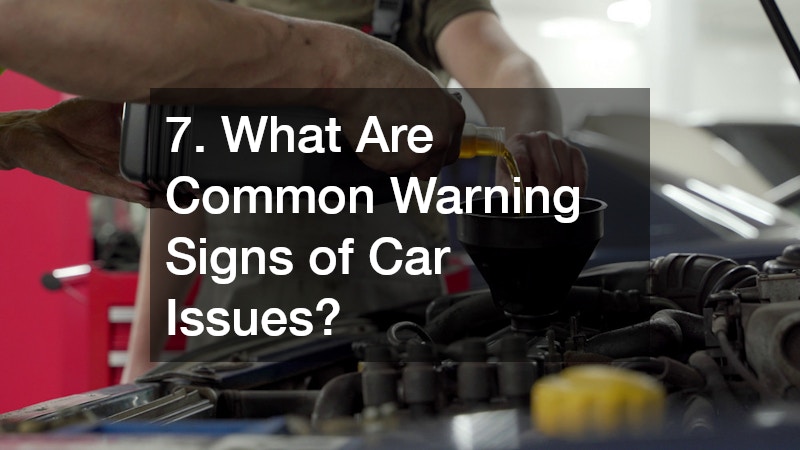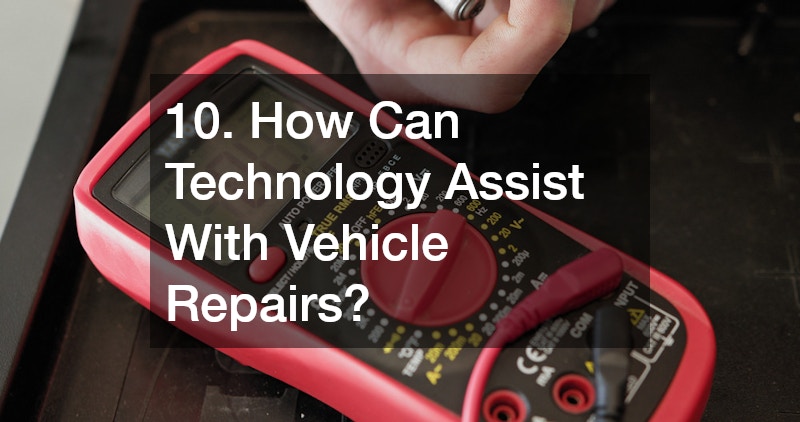Understanding the basics of vehicle repairs is crucial for new car owners. This article explores essential facts about common vehicle repairs that you should be aware of, helping you maintain your vehicle efficiently and save on unexpected costs. Being knowledgeable about these factors can make your journey as a car owner smoother and more cost-effective, ensuring that your vehicle remains a reliable mode of transportation. One of the first things new car owners should understand is the importance of routine maintenance. Simple tasks like regular oil changes, tire rotations, and fluid checks may seem minor, but they play a vital role in keeping your car running smoothly. Neglecting these basics can lead to increased wear and tear, reduced fuel efficiency, and even engine failure over time. Many modern vehicles come with maintenance schedules outlined in the owner’s manual, making it easier to keep track of when services are due.
Another essential repair area is brake system maintenance. Brakes are a critical safety component, and recognizing early signs of wear, such as squeaking, grinding noises, or a spongy brake pedal, can prevent more serious damage and higher repair costs. Replacing brake pads and servicing rotors when necessary ensures your car remains safe to drive, especially in emergencies. Tire care is another priority for vehicle longevity and performance. Driving on worn or improperly inflated tires can compromise safety, reduce fuel efficiency, and cause uneven wear. Regularly inspecting tread depth, checking tire pressure, and aligning your wheels can save you from blowouts or premature replacements. Rotating your tires every 5,000 to 8,000 miles helps extend their lifespan and maintains even wear.
Battery health is also something new owners should keep in mind. Car batteries typically last three to five years, but extreme temperatures and infrequent use can shorten their life. If you notice slow engine starts or dimming lights, it could be time for a battery check. Many auto repair shops offer free battery testing, which can help catch problems early. Lastly, don’t underestimate the importance of your vehicle’s cooling system. Overheating can cause major engine damage, so monitoring coolant levels and scheduling periodic radiator flushes can help avoid serious issues. Leaking coolant, temperature spikes, or a dashboard warning light are all signs that require immediate attention.
1. What Are the Most Frequent Vehicle Repairs Needed?

When it comes to vehicle maintenance, some repairs are more common than others. One of the most common vehicle repairs is fixing or replacing brakes. Regular visits to a brake shop can help prevent more significant issues and ensure your vehicle remains safe. Another typical repair involves tires, which can suffer from wear and tear. Rotating and balancing tires regularly can extend their lifespan and ensure a smoother ride. Vehicle inspections often reveal tire-related issues, necessitating immediate corrective actions. Battery replacements are also among the most common vehicle repairs. Over time, a car battery loses its effectiveness, and diagnosing the issue is critical to avoid being stranded. Regular checks during vehicle maintenance ensure your battery is in top condition.
Engine-related repairs also rank high among common vehicle issues. Problems such as worn spark plugs, malfunctioning sensors, or timing belt wear can affect performance and fuel efficiency. Addressing these concerns early during scheduled maintenance can help avoid expensive breakdowns. Another frequent repair involves the vehicle’s suspension system, including shocks and struts. When these parts wear out, drivers may experience a rougher ride or difficulty steering. Ignoring suspension issues can lead to uneven tire wear and compromised handling. By staying proactive and addressing these common vehicle repairs early, drivers can extend the lifespan of their cars and maintain a safer driving experience.
2. How Often Should I Get My Car Serviced?
Regular vehicle maintenance is pivotal in keeping your car in optimal condition. Ideally, you should follow a routine schedule for servicing your car, which might include an emissions test if required by your local laws. These tests ensure that your car’s emissions are within legal limits, reducing environmental impact.
In addition to statutory checks, common vehicle repairs should prompt a service visit. Depending on your vehicle model and usage patterns, you might need to service your car every 5,000 to 10,000 miles. Consult your vehicle’s manual for specific recommendations and maintain a service log for reference.
Routine maintenance reduces the risk of unexpected repairs and can identify potential issues early. This proactive approach to managing your vehicle health can prevent costly car repairs down the line. Using digital tools, such as auto repair marketing software, can help you schedule appointments and track servicing needs efficiently.
3. Why Is Regular Maintenance Important?
Regular vehicle maintenance is crucial in preventing more extensive and costly car repairs. By staying ahead of potential problems, you ensure that your vehicle operates smoothly and efficiently. This proactive approach enhances safety and reduces the risk of breakdowns.
Common vehicle repairs identified during routine checks include adjustments to brake systems, tire alignments, and engine diagnostics. Consistent maintenance ensures that these issues are caught early. Diesel engine experts emphasize periodic checks to maintain engine health and durability.
The investment in maintenance pays off in the long run by extending the vehicle’s lifespan and preserving resale value. It also provides peace of mind, knowing your vehicle is less likely to experience unexpected failures. Aspects like regular oil changes, brake pad replacements, and tune-ups are indispensable components of this routine.
4. What Are the Costs Associated With Common Repairs?

Understanding the costs of common vehicle repairs can help in budgeting and financial planning. Repairs like brake replacements at a brake shop can range from moderate to expensive, depending on the parts required and labor involved. Always request a detailed estimate from the shop to avoid surprises.
Tire repairs and balancing are another expense that varies based on the type of tires and the extent of wear and tear. Opting for high-quality tires can be a wise investment, offering better performance and longevity. It’s advisable to shop around by visiting various service centers, like an Audi service center, if you own that brand, to compare prices.
Costs can also arise from unexpected issues identified during a routine vehicle inspection. Budgeting for these potential expenses helps mitigate financial strain. Having auto insurance that covers certain repairs could alleviate some of these financial burdens, safeguarding against unforeseen circumstances.
5. Can I Perform Some Vehicle Repairs Myself?
For those wanting to save on vehicle maintenance costs, some common vehicle repairs can be handled independently. Tasks such as changing the oil, replacing air filters, and swapping out wiper blades are straightforward. Having a basic understanding of your car and access to reliable instructional guides can make these tasks manageable.
However, it’s essential to know your limits and recognize when a repair requires a professional touch. Complex repairs, like engine diagnostics or brake system issues, should be handled by experts. An amateur attempt at these repairs might lead to more harm than good.
Performing minor repairs yourself can be empowering and add to your car knowledge. It’s a learning opportunity that can also involve safety considerations, like proper handling of tools and safe lifting techniques. While DIY repairs are cost-saving, always balance them against the potential risk involved.
6. How Do I Find a Trusted Mechanic?
Finding a trusted mechanic is invaluable for consistent vehicle maintenance and handling common vehicle repairs. Start your search by gathering recommendations from friends or reading online reviews. A mechanic’s reputation is often indicative of their service quality.
Look for certifications and affiliations that vouch for the mechanic’s expertise. Memberships in industry organizations or using advanced auto repair marketing software showcases their commitment to industry standards. Transparency in pricing and communication should also be a key criteria in selecting a mechanic.
Consider visiting local service providers, like a trusted truck repair garage, if you own heavy-duty vehicles, to evaluate their services. Conversations with the mechanic can provide insights into their approach and reliability. Establishing a relationship with a single mechanic ensures consistency in vehicle health monitoring.
7. What Are Common Warning Signs of Car Issues?

A vital aspect of vehicle maintenance is recognizing the warning signs of potential problems. Unusual noises, such as squealing brakes or grinding sounds, often indicate issues that need immediate attention. Prompt action can prevent these from translating into more serious common vehicle repairs.
Fluids beneath your car, such as oil or coolant puddles, can signal leaks that may require professional diagnosis. Regular vehicle inspection can catch these leaks early. Keeping an eye on dashboard alerts and warning lights is also important, and diesel engine experts specifically advise on responding to these signals promptly.
Vibrations or difficulty steering might suggest alignment problems that should be addressed at the earliest opportunity. These warning signs are a call to action for car owners, emphasizing the importance of regular check-ups at a reliable service center. Being attentive to such cues prolongs your vehicle’s operational efficiency and safety.
8. How Do Weather Conditions Affect Vehicle Repairs?
Weather conditions can significantly impact vehicle maintenance and the frequency of common vehicle repairs. Harsh winters might contribute to battery drain and reduced tire pressure, necessitating timely attention. Summer heat can stress cooling systems and prompt maintenance reminders.
Rainy seasons can lead to rusting and wear on brake systems, recommending regular brake inspections at a brake shop. Understanding your local climate’s impact can help in anticipating maintenance schedules and avoid damage. Regions prone to snow and ice require special tire considerations to ensure vehicle safety.
Visiting an Audi service center or similar specialized facilities can provide tailored advice based on weather impacts. Professionals can offer insights into seasonal vehicle care, enhancing vehicle longevity. This proactive adaptation to weather changes is crucial for comprehensive vehicle health management.
9. What Is the Difference Between Maintenance and Repairs?
Understanding the distinction between maintenance and repairs is essential for proper vehicle upkeep. Vehicle maintenance involves routine procedures like oil changes and tire rotations that prevent larger issues. It’s the preventive care that ensures smooth vehicle operation.
In contrast, repairs focus on fixing existing problems, such as addressing a malfunctioning engine part. Repairs often arise unexpectedly and might demand urgent attention to prevent safety risks. Recognizing when a truck repair garage visit is necessary is critical.
By emphasizing vehicle maintenance, car owners can minimize the need for frequent repairs. The routine care keeps the car road-ready and safe, while being diligent about necessary repairs when problems occur mitigates further damage. Balancing both aspects is the key to vehicle longevity and cost management.
10. How Can Technology Assist With Vehicle Repairs?

Technology plays a pivotal role in modern vehicle maintenance and addressing common vehicle repairs. Diagnostic tools have become increasingly sophisticated, allowing for quick identification of issues. This precise analysis simplifies the troubleshooting process, saving time and resources.
Innovations like auto repair marketing software streamline communication between car owners and service providers. These platforms schedule appointments, provide reminders, and track service history efficiently. Such tools are invaluable for maintaining a seamless relationship with your service center.
Furthermore, advanced technologies in auto insurance now offer coverage that extends to certain repairs, reducing out-of-pocket expenses. Embracing such technological tools results in more effective vehicle management. Staying informed about these advancements ensures you maximize their benefits for your vehicle’s care.
Knowing These Common Vehicle Repair Facts
Being informed about common vehicle repairs and maintenance can empower you as a car owner, ensuring your vehicle remains safe, reliable, and efficient. The knowledge gained from understanding these key aspects helps you anticipate and manage potential issues effectively. By engaging in routine maintenance and embracing technological advancements, you foster a proactive vehicle care approach.
Incorporating these strategies reduces the likelihood of high-cost repairs and enhances overall vehicle longevity. It also grants you confidence in your vehicle’s performance, knowing that it is well-maintained and cared for. Staying informed and responsive to your car’s needs will significantly contribute to a positive car ownership experience.
Ultimately, the more you know about your vehicle’s repair and maintenance, the more equipped you’ll be to handle any challenges that arise. This proactive mindset transforms reactive repairs into manageable routine checks. As a new car owner, this article equips you with foundational tips, preparing you for a fulfilling journey in car ownership.



